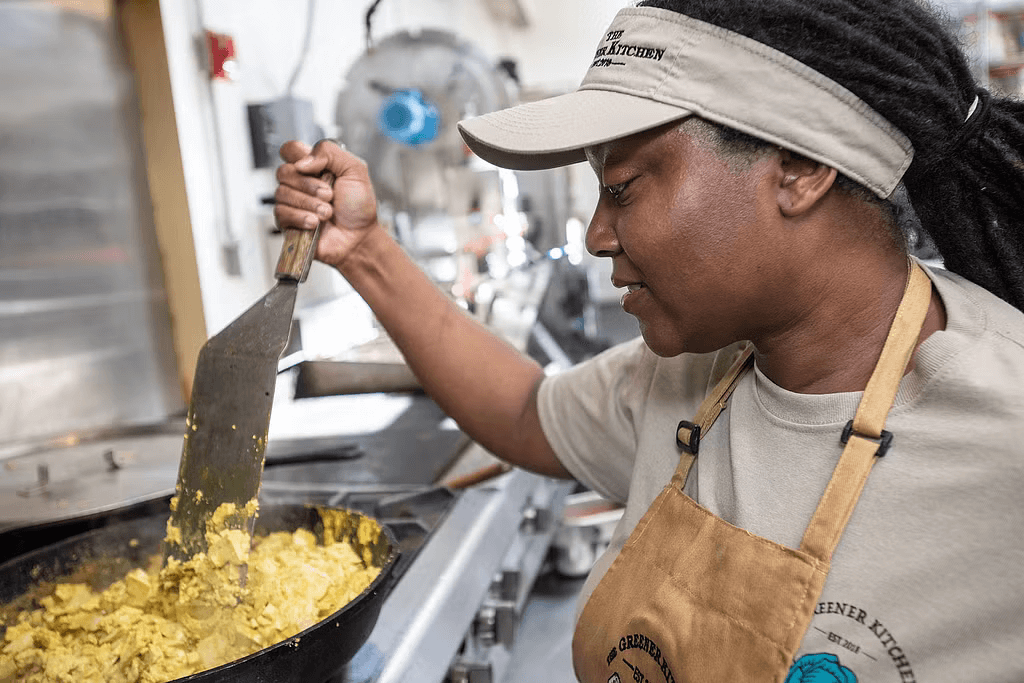Brenda Sanders and plant-based food for everyone
“When you’re living in the projects, you’re not thinking about where your food comes from.”
With no grocery store within walking distance of her home, Brenda Sanders’ childhood diet was not afforded the privilege of choice, instead chock full of whatever processed foods were available. If you can get your hands on mac and cheese, that’s a win—no need to think about where cheese comes from, or whether eating it four days in a row is good for your body. Having a full belly was the priority, and in an area of food apartheid, cows were less than afterthoughts; they were non-thoughts.
It wasn’t until she learned about the racial health disparities that Brenda started to make the connections, setting the stage for the food justice outreach work she’s committed herself to for the past two decades.

Brenda Sanders prepares food in The Greener Kitchen
She started doing culinary and nutritional education around her native Baltimore, setting up cooking demos in church basements and community gathering spaces. Later, she worked with her neighbors in the Penn North neighborhood to transform a vacant lot into an urban garden. Now, she heads the Afro-Vegan Society, a Black-led and Black-centering nonprofit that aims to make vegan living more accessible to everyone. From meal planning help to a directory of Black-owned vegan eateries to month-long activist trainings, AVS is working to support, normalize, and amplify the important work Black vegans are doing. Here’s what Brenda has to say about her work in her own words:
Where does your motivation come from?
The motivation for my work has always been about service to others. Whether it’s working to make sure people have healthy food access, educating people about environmental justice issues, or doing animal advocacy, the main goal of my work is to do what I can to make circumstances better for others. From the early years in my career when I was doing free cooking demos in churches and community centers, to now speaking in front of thousands of people at conferences and festivals, my mission continues to be to shed light on the ways that moving towards a plant-centered diet can help to address many of the challenges we’re facing today.
Why is plant-forward eating—and thinking—important to you?
My work is all about getting people to reimagine the foods they eat.
There’s such a huge need right now to rethink the way we’re engaging with food as a whole, and adopting a plant-forward way of looking at our food system in general—and our plates in particular—can go such a long way towards beginning to address some of the major pressing issues of our time.
Issues like the fishing industry driving marine ecosystem collapse, factory farms being a major contributor to greenhouse gas emissions, clear-cutting of forests to raise cattle exacerbating soil erosion— these and many other issues can start being addressed with food system change, which requires a change in our thinking.
What is unique and special about your community or culture that makes it easy to normalize vegan or plant-based values?
In my community, we’ve been dealing with health disparities for so many generations that there’s an openness to accepting new information about diet and lifestyle. Once people learn that there’s a different way of experiencing food that could benefit them and their families, they’re open to trying it.
Contrary to what many folks believe, the fact that plant-based eating isn’t the norm in marginalized communities isn’t because people are closed to the idea, but because the information, access and support isn’t there for people to make these changes to their diets.
When educational programming and support are made available to people from marginalized communities, they are much more eager to experiment with adding more plant-based foods to their diets.
How does the food we serve on our plates reflect our cultural norms?
First and foremost, there should be food on every single person’s plate, and if there isn’t then we’re accepting hunger as a social norm (and it obviously shouldn’t be). Also, if the only food available to some people is unhealthy packaged animal products, then culturally we’re accepting that everyone doesn’t have the right to access fresh, healthy, plant-based food options.
The ultimate goal should be that the foods we serve on our plates reflect a culture that normalizes healthier, more sustainable plant-forward eating, and that’s why I’m working to help people to “flip” the way they think about food, which will start the process of flipping our cultural/societal norms.
In working to promote plant-forward eating in marginalized communities, I’ve been actively challenging the stereotype that only wealthy people care about eating healthier foods and that lower-income people—especially people of color—don’t care about the foods they eat, the environment, or animal welfare.
We do care, and we’re leading the charge to flip an unjust food system.